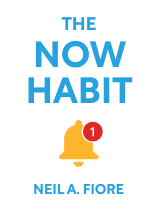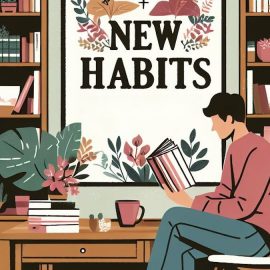

This article is an excerpt from the Shortform book guide to "The Now Habit" by Neil A. Fiore. Shortform has the world's best summaries and analyses of books you should be reading.
Like this article? Sign up for a free trial here.
Do you tend to procrastinate on important projects, delaying them until the last minute? Why do we procrastinate? Is procrastination a symptom of laziness?
Before we can tackle procrastination, we need to understand why we procrastinate in the first place. According to Neil Fiore, the author of The Now Habit, procrastination isn’t a character flaw—it’s a symptom of underlying psychological distress.
Here’s why we procrastinate and how to avoid it, according to Neil Fiore.
Debunking the Myth: Procrastination Isn’t Laziness
Traditionally, we tend to think that procrastination results from laziness. In this view, procrastination in itself is the fundamental problem: It results from a failure of motivation or willpower, and the solution is to try harder and be more disciplined. In contrast, Fiore argues that procrastination isn’t the primary problem—instead, he says that we procrastinate because we’re anxious about starting (or finishing) a task. In his view, procrastination is a natural coping mechanism that we adopt in order to deal with the stress we feel about the task.
Unfortunately, Fiore argues, we’ve been conditioned by parents, teachers, supervisors, and society at large to believe the laziness interpretation—which only makes the problem worse. He says we’re taught that work should be difficult and unpleasant and that playing and relaxing are frivolous wastes of time. As a result, he says, we come to dread work, which makes us want to avoid it—but then we feel guilty whenever we’re not working, and we’re unwilling to schedule deliberate time to play (since that time could be “better” used by doing more work).
These attitudes combine to form a vicious cycle: We feel so much stress and guilt about work that we hide from it by procrastinating, which only adds to the stress and guilt, leading to more avoidance. And because we feel we can’t play (at least, not until our work is done, which it never is), we begin to resent work for keeping us from the things we’d rather be doing.
Fiore says that the solution is to undo our traditional assumptions about work and play. His idea is that by making time for leisure and relaxation, we lead more balanced and fulfilling lives, and we stop resenting work for taking up all our time. Likewise, instead of assuming that work should be difficult and unpleasant, he recommends finding ways to make it easier so as to lower the pressure we feel around it.
Why We Dread Work
Fiore says that procrastination is a symptom of anxiety about work, so in order to better understand why we procrastinate and how to avoid it, we’ll start by looking at some of the reasons we find work so stressful in the first place.
Perfectionism
Fiore argues that the most common reason we dread work is perfectionism—we set impossibly high standards for ourselves and tell ourselves there will be dire consequences for not meeting those standards. For example, a student might tell herself she has to get straight As or else she’s a failure who’ll never get a good job. Fiore points out that we often adopt these standards from others—parents, teachers, bosses, and so on.
According to Fiore, perfectionism makes it hard to even start working on something. If your goal is to be perfect, you’re all but guaranteed to fail—so why even put in the effort? Then, Fiore says, once we procrastinate, we typically feel bad and tell ourselves we’re lazy. That negative self-talk creates more anxiety, which in turn only makes it harder to get back to work by creating even more pressure.
Fear of Success
Whereas perfectionism makes us avoid working because we fear failure, Fiore says that it’s also possible to procrastinate because we fear success. Fear of success can occur for several reasons:
1) We fear that we’ll alienate our friends, colleagues, or family if we outperform them. For example, a straight-A student might deliberately reduce the effort she puts into her schoolwork for fear that her friends will brand her a “nerd” or “teacher’s pet.”
2) We’re uneasy about the major life changes that sometimes come with success. For example, a successful job search might mean moving to a new place, adapting to a new social environment, and learning a new set of skills and responsibilities.
3) We fear that succeeding will raise other people’s expectations until we hit the point where we’re guaranteed to disappoint them. For example, our hypothetical student might not want to earn straight As because she suspects that earning them once will make her parents and teachers expect her to earn them every semester.
Frustration and Powerlessness
Lastly, Fiore argues that we sometimes procrastinate as a way of controlling our situation. For example, if you feel powerless in your job, you may subconsciously feel that avoiding work is the only way to express yourself. Similarly, Fiore points out that if you’ve internalized the lesson that you should always be working and should never take time to play, you might conclude that there’s no point in working hard because hard work just leads to more hard work. When that happens, we procrastinate because procrastination seems like our only possible escape from the drudgery of life itself.
The Pattern of Procrastination
Now that we’ve explored why we procrastinate, we’ll examine what procrastination actually looks like so that you can recognize it in your own life. Fiore says that procrastination tends to follow a predictable pattern:
1) You make a task seem more momentous than it really is by thinking that your identity, happiness, worthiness, and so on depend on your success. For example, if you have a job interview, you might tell yourself that you need this job to keep your life on track and that if you don’t get it, you’ll be a failure. Suddenly your entire future—and your value as a person—seems to rest on a brief conversation with a stranger.
2) You determine that only perfect success is good enough and that anything less would be catastrophic. This makes the task seem impossibly difficult and frightening. For example, you might tell yourself that you have to completely blow away your interviewer. All your answers need to be eloquent and insightful. You can’t misspeak or look the slightest bit unprepared. Obviously, this is a completely unreasonable standard to expect of yourself.
3) Because of the pressure you’ve piled onto the task, you freeze up—instead of starting on the task, you just keep thinking of all the things that could go wrong. For example, instead of planning for the interview, you just keep telling yourself how difficult and stressful the interview will be and how likely you are to screw it up. In other words, when the self-imposed stress becomes too much, you procrastinate by avoiding the task altogether.
4) Finally, you wait until some external pressure—like an impending deadline or consequence—forces you to do the task. Because you’re rushed, you’re likely to do the task in a haphazard way, which means you won’t do it as well as you were capable of. For example, your job interview is on the calendar—no matter how much you procrastinate, you’ll have to show up whether you’re prepared or not.

———End of Preview———
Like what you just read? Read the rest of the world's best book summary and analysis of Neil A. Fiore's "The Now Habit" at Shortform.
Here's what you'll find in our full The Now Habit summary:
- Why people tend to put off the things that matter the most
- Where procrastination stems from, and why it doesn't mean you're lazy
- How to get more done while still maintaining a balanced life






